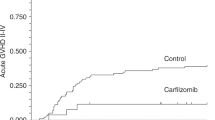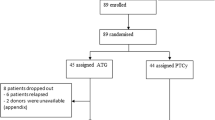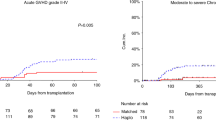Abstract
SCT from an HLA-compatible sibling donor is an adoptive immunotherapy for cytokine-refractory, metastatic clear-cell renal cell cancer (RCC). However, the recent introduction of targeted therapy compounds has reduced the interest in this therapeutic strategy. We have reanalyzed our series with the aim to assess long-term benefit from allografting. Twenty-five RCC patients received a reduced-intensity allograft from an HLA-identical sibling donor. All patients received a thiotepa, fludarabine and CY conditioning regimen, and a cyclosporine-based GVHD prophylaxis. Best response to allograft was evaluable in 24 patients: 1 CR, 4 PR, 12 minor response/stable disease, 7 progressive disease. One-year survival was 48%, and five-year survival was 20%. At a median observation time of 65 months, five patients are alive, one in CR, one in PR and three with stable disease. By multivariate analysis, C-reactive protein value before transplant, the number of CD34+ infused cells and disease status at day +90 significantly correlated with survival. Survival of patients at favorable/intermediate-risk according to the MSKCC score that underwent allografting was better in comparison to the survival predicted by historical controls. We conclude that 20% of cytokine-refractory RCC patients are alive long-term after allografting. Transplantation is able to induce long-term disease control in a fraction of relapsed RCC patients
This is a preview of subscription content, access via your institution
Access options
Subscribe to this journal
Receive 12 print issues and online access
$259.00 per year
only $21.58 per issue
Buy this article
- Purchase on Springer Link
- Instant access to full article PDF
Prices may be subject to local taxes which are calculated during checkout



Similar content being viewed by others
References
Childs R, Chernoff A, Contentin N, Bahceci E, Schrump D, Leitman S et al. Regression of metastatic renal-cell carcinoma after nonmyeloablative allogeneic peripheral-blood stem-cell transplantation. N Engl J Med 2000; 343: 750–758.
Demirer T, Barkholt L, Blaise D, Pedrazzoli P, Aglietta M, Carella AM et al. Transplantation of allogeneic hematopoietic stem cells: an emerging treatment modality for solid tumors. Nat Clin Pract Oncol 2008; 5: 256–267.
Barkholt L, Bregni M, Remberger M, Blaise D, Peccatori J, Massenkeil G et al. Allogeneic haematopoietic stem cell transplantation for metastatic renal carcinoma in Europe. Ann Oncol 2006; 17: 1134–1140.
Peccatori J, Barkholt L, Demirer T, Sormani MP, Bruzzi P, Ciceri F et al. Prognostic factors for survival in patients with advanced renal cell carcinoma undergoing nonmyeloablative allogeneic stem cell transplantation. Cancer 2005; 104: 2099–2103.
Motzer RJ, Bukowski RM . Targeted therapy for metastatic renal cell carcinoma. J Clin Oncol 2006; 24: 5601–5608.
Bregni M, Dodero A, Peccatori J, Pescarollo A, Bernardi M, Sassi I et al. Nonmyeloablative conditioning followed by hematopoietic cell allografting and donor lymphocyte infusions for patients with metastatic renal and breast cancer. Blood 2002; 99: 4234–4236.
Cox DR . Regression models and life tables. J R Stat Soc 1972; 34 Series B: 187.220–226.
Klein JP, Rizzo JD, Zhang MJ, Keiding N . Statistical methods for the analysis and presentation of the results of bone marrow transplants. Part I: Unadjusted analysis. Bone Marrow Transplant 2001; 28: 909–915. Part II: Regression modelling. Bone Marrow Transplant 2001; 28: 1001–1011.
Kaplan EL, Meier P . Non-parametric estimation from incomplete observations. J Am Stat Assoc 1958; 53: 457–481.
Baron F, Maris MB, Sandmaier BM, Storer BE, Sorror M, Diaconescu R et al. Graft-versus-tumor effects after allogeneic hematopoietic cell transplantation with nonmyeloablative conditioning. J Clin Oncol 2005; 23: 1993–2003.
Motzer RJ, Bacik J, Schwartz LH, Reuter V, Russo P, Marion S et al. Prognostic factors for survival in previously treated patients with metastatic renal cell carcinoma. J Clin Oncol 2004; 22: 454–463.
Takahashi Y, Harashima N, Kajigaya SH, Yokoyama H, Cherkasova E, McCoy JP et al. Regression of human kidney cancer following allogeneic stem cell transplantation is associated with recognition of an HERV-E antigen by T cells. J Clin Invest 2008; 118: 1099–1109.
Blaise D, Bay JO, Faucher C, Michallet M, Boiron JM, Choufi B et al. Reduced-intensity preparative regimen and allogeneic stem cell transplantation for advanced solid tumors. Blood 2004; 103: 435–441.
Hudes G, Carducci M, Tomczac P, Dutcher J, Figlin R, Kapoor A et al. Temsirolimus, interferon alfa, or both for advanced renal-cell carcinoma. N Engl J Med 2007; 356: 2271–2281.
Escudier B, Pluzanska A, Koralewski P, Ravaud A, Bracarda S, Szczylik C et al. Bevacizumab plus interferon alfa-2a for treatment of metastatic renal cell carcinoma: a randomised, double-blind phase III trial. Lancet 2007; 370: 2103–2111.
Motzer RJ, Hutson TE, Tomczac P, Michaelson MD, Bukowski RM, Rixe O et al. Sunitinib versus interferon alfa in metastatic renal-cell carcinoma. N Engl J Med 2007; 356: 115–124.
Escudier B, Eisen T, Stadler WM, Szczylik C, Oudard S, Siebels M et al. Sorafenib in advanced clear-cell renal-cell carcinoma. N Engl J Med 2007; 356: 125–134.
Gabrilovich DI, Chen HL, Girgis KR, Cunningham HT, Meny GM, Nadaf S et al. Production of vascular endothelial growth factor by human tumors inhibits the functional maturation of dendritic cells. Nat Med 1996; 2: 1096–1103.
Suppiah R, Finke J, Rini BI, Richmond A, Wood L, Elson P et al. T regulatory cells (Treg) in patients with metastatic renal cell carcinoma (mRCC) decrease during Sunitinib treatment: correlation with clinical responses and T helper 1/T helper 2 (Th1/Th2) bias. J Clin Oncol 2006; 24: 1065a.
Zeiser R, Leveson-Gower DB, Zambricki EA, Kambham N, Beilhack A, Loh J et al. Differential impact of mammalian target of rapamycin inhibition on CD4+CD25+Foxp3+ regulatory T cells compared with conventional CD4+ T cells. Blood 2008; 111: 453–462.
Acknowledgements
We thank the doctors and the nurses of the Bone Marrow Transplant Unit for their dedicated patient care, and Ms Stefania Trinca for data management. This work has been supported by AIRC Regional Grant and by Ricerca Finalizzata 2005 to MBr.
Author information
Authors and Affiliations
Corresponding author
Rights and permissions
About this article
Cite this article
Bregni, M., Bernardi, M., Servida, P. et al. Long-term follow-up of metastatic renal cancer patients undergoing reduced-intensity allografting. Bone Marrow Transplant 44, 237–242 (2009). https://doi.org/10.1038/bmt.2009.9
Received:
Revised:
Accepted:
Published:
Issue Date:
DOI: https://doi.org/10.1038/bmt.2009.9
Keywords
This article is cited by
-
Impact of HLA-G polymorphism on the outcome of allogeneic hematopoietic stem cell transplantation for metastatic renal cell carcinoma
Bone Marrow Transplantation (2018)
-
Is allogeneic transplant for solid tumors still alive?
Bone Marrow Transplantation (2016)
-
Haploidentical hematopoietic SCT increases graft-versus-tumor effect against renal cell carcinoma
Bone Marrow Transplantation (2013)
-
Combining allografting with mTOR inhibitors for metastatic renal cell cancer
Bone Marrow Transplantation (2011)
-
Combining allogeneic immunotherapy with an mTOR inhibitor for advanced renal cell carcinoma
Bone Marrow Transplantation (2010)



